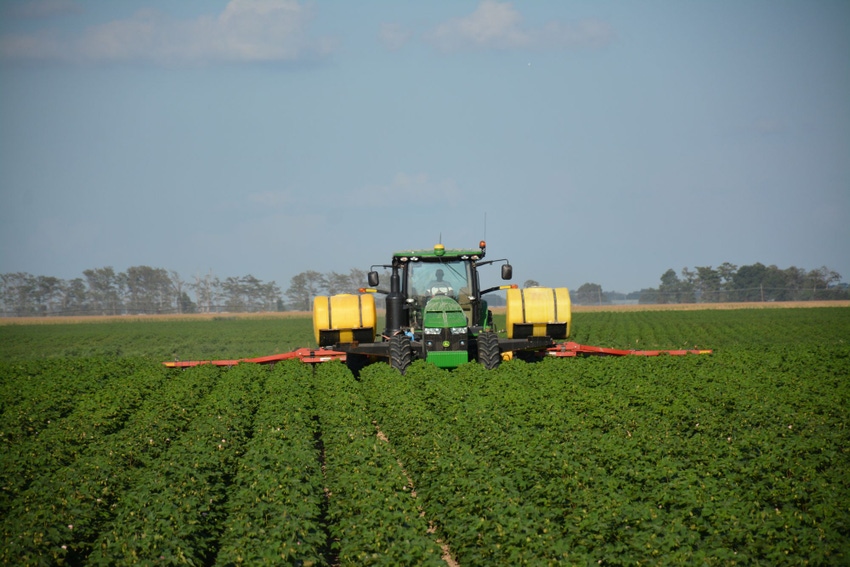
Rep. Mike Conaway, chairman of the House Agriculture Committee, is scheduled to speak during the Cotton Economics Symposium at the National Cotton Council’s Beltwide Cotton Conferences in Dallas on Jan. 5.
Chairman Conaway, who represents Texas’ 11th Congressional District, will provide an update on U.S. agricultural policy and the 2018 farm bill if the schedule for the opening of the new Congress permits.
His presentation, which could provide cotton producers with a new assessment of the chances for passage of legislation requiring the secretary of agriculture to designate cottonseed as an other oilseed under the 2014 farm bill, is scheduled to take place following the Cotton Marketer of the Year Award at the Beltwide at 10:40 a.m. on Jan. 5.
Rep. Conaway will be followed by presentations by Berrye Worsham, CEO of Cotton Incorporated, on Trends in Retail Use of Cotton and Jody Campiche, vice president for economics at the NCC, on the Short-Term U.S. Cotton Outlook.
The speech will be one of the highlights of this year’s Beltwide, which will begin with the Consultants Conference at 1 p.m. on Jan. 4 and end with the final presentations for the Beltwide Technical Conferences at noon on Jan. 6.
New herbicide technologies
The Consultants Conference, which has become one of the best-attended sessions of the Beltwide, will feature presentations on the new Xtendimax and Enlist Duo herbicides; updates on the status of aldicarb or Temik; reports on target spot, which caused significant yield loss in 2016, and bacterial blight; and strategies for reducing cotton contamination.
It will be followed by the New Developments from Industry session, which will also include reports on target spot, new nematicide treatments and introduction of new cotton varieties for 2017.
The 2017 Beltwide can help its attendees improve production, processing and marketing efficiency by providing them with insight into the latest available tools and research findings, according to the NCC.
Those planning to attend the concurrent conferences, set for January 4-6 at the Hyatt Regency Dallas Hotel in Dallas, are urged to register and make their hotel reservations. Information regarding those arrangements is on the BWCC website at www.cotton.org/beltwide/. That site also includes the preliminary online program and general information about the BWCC.
Smart irrigation app
The 2017 BWCC will begin at noon on Jan. 4 with the half-day Cotton Consultants Conference –open to all attendees. That Conference will focus on topics of interest selected by a panel of consultants.
Besides the updates on the status of and educational efforts for the use of auxin herbicides on transgenic cottons by Dow and Monsanto, the Consultants Conference will include discussions on the Smartirrigation Cotton App with a National Footprint, a unique irrigation scheduling tool originally limited to Georgia and Florida that now is usable across the entire U.S. Cotton Belt.
The BWCC cotton technical conferences, which will provide updates on research and a look into the technology pipeline, will meet concurrently beginning on the morning of Jan. 5 and conclude by noon on Jan. 6.
Among the useful information that can be gleaned from those sessions will be entomologists’ updates on the latest research with regard to several classes of insecticides and reports on successful weed management strategies.
For example, the Weed Science Research Conference will include a presentation on achieving crop safety and weed control using varieties resistant to auxin herbicides.
Consolidation of conferences
For 2017, the cotton agronomy, physiology, and soil technical conferences will be combined into one conference with multiple sessions. Some topics being considered for this conference are a highly comprehensive simulation model of cotton physiology, nitrogen management for subsurface drip-irrigated cotton and quality/yield evaluation trials across the Cotton Belt.
The Ginning Conference will include several presentations critical to efficient processing and marketing such as module averaging and lint contamination prevention, specifically the challenge presented by various plastic contaminants in seed cotton.
This conference will include a panel discussion on the issues associated with ginning cotton varieties with small seed size. Beginning on the afternoon of Jan. 4, the National Cotton Ginners’ Association will hold several committee and subcommittee meetings. A schedule of those meetings is at http://www.cotton.org/ncga/index.cfm.
In addition to the multitude of oral presentations, most of the technical conferences and the Consultants Conference will feature poster sessions that also include results from studies conducted by world-class researchers.
Registration costs before Dec. 16 for the NCC-coordinated forum are: $200 for NCC/Cotton Foundation members, university and USDA researchers, Extension personnel, associations and consultants; $400 for non-NCC/Foundation members; and $80 for students.
Stakeholders meetings
On-site conference self-registration kiosks will be available 24 hours a day beginning on the evening of Jan. 3. Starting on the morning of Jan. 4, NCC staff will be available for attendees needing assistance with registration and name badge printing.
The Beltwide Cotton Conferences annually brings together those with a stake in a healthy U.S. cotton production sector, among them university and USDA researchers, Extension personnel/agents, consultants, and industry sales/support personnel.
For more information, visit www.cotton.org/beltwide.
About the Author(s)
You May Also Like






